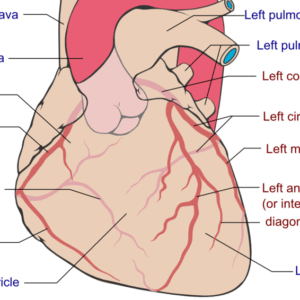Cardiology > Rheumatic Heart Disease (RHD)
Rheumatic Heart Disease (RHD)
Background
Rheumatic heart disease (RHD) is the chronic cardiac sequela of acute rheumatic fever (ARF), resulting from autoimmune inflammation triggered by untreated or inadequately treated group A Streptococcus (GAS) pharyngitis. RHD is characterized by permanent damage to the heart valves—most commonly the mitral valve—due to repeated or severe episodes of rheumatic carditis. The damage may lead to valvular stenosis or regurgitation, eventually progressing to heart failure, arrhythmias, or thromboembolic events.
II) Classification/Types
By Valve Involvement:
- Mitral valve disease: Most common; often mitral regurgitation or stenosis
- Aortic valve disease: Often coexists with mitral disease
- Tricuspid/pulmonary valve involvement: Rare
By Lesion Type:
- Regurgitant lesions: Valvular incompetence (early stage)
- Stenotic lesions: Fibrotic narrowing of valve orifice (late stage)
By Chronicity:
- Latent RHD: Detected only via echocardiography; asymptomatic
- Clinically evident RHD: Presents with heart murmurs, symptoms of heart failure, or complications such as atrial fibrillation
Pathophysiology
RHD develops from persistent inflammation during episodes of acute rheumatic fever, where immune cross-reactivity between GAS M proteins and cardiac tissues leads to repeated injury. Inflammatory infiltration causes fibrinoid necrosis of valves, followed by fibrosis, commissural fusion, and calcification. Chronic valvular deformity leads to hemodynamic changes such as left atrial enlargement, pulmonary hypertension, and eventual ventricular dysfunction.
Epidemiology
- Prevalent in children and young adults in low- and middle-income countries
- Leading cause of acquired heart disease in children globally
- More common in females
- Often diagnosed in adolescence or early adulthood
- Up to 40 million people affected worldwide; >300,000 deaths annually
Etiology
I) Causes
- Sequela of repeated or severe episodes of acute rheumatic fever
- Chronic immune-mediated damage from GAS pharyngitis
II) Risk Factors
- History of untreated or inadequately treated streptococcal sore throat
- Recurrence of acute rheumatic fever
- Poor access to healthcare
- Crowded living conditions
- Genetic susceptibility (e.g., HLA class II alleles)
Clinical Presentation
I) History (Symptoms)
- Dyspnea on exertion, orthopnea, or paroxysmal nocturnal dyspnea
- Palpitations (often due to atrial fibrillation)
- Fatigue or reduced exercise tolerance
- Chest pain (less common)
- History of ARF (especially with carditis)
II) Physical Exam (Signs)
- Heart murmurs (e.g., mid-diastolic rumble in mitral stenosis; holosystolic murmur in mitral regurgitation)
- Irregularly irregular pulse (atrial fibrillation)
- Signs of heart failure: rales, jugular venous distension, edema
- Hepatomegaly (with right-sided failure)
- Thrills or palpable heaves in advanced disease
Differential Diagnosis (DDx)
- Degenerative valve disease
- Infective endocarditis
- Congenital valve anomalies
- Dilated or hypertrophic cardiomyopathy
- Autoimmune valvulitis (e.g., SLE)
Diagnostic Tests
Initial Work-Up
- Echocardiography: Gold standard for valve morphology and function
- ECG: May show atrial fibrillation, left atrial enlargement
- Chest X-ray: Cardiomegaly, pulmonary congestion
- ASO titers or anti-DNase B: If assessing recent streptococcal exposure
- CBC, ESR/CRP: Inflammatory markers (elevated in active disease)
Advanced Testing
- Transesophageal echocardiography (TEE): For better visualization in surgical planning
- Cardiac MRI: Valve anatomy, fibrosis (if echocardiogram inconclusive)
- BNP or NT-proBNP: Assess for heart failure severity
- Holter monitoring: Evaluate arrhythmias (e.g., paroxysmal AF)
Treatment
I) Initial Approach
- Treat acute carditis if active inflammation is present
- Manage heart failure symptoms
- Initiate or continue secondary prophylaxis with penicillin
- Monitor valve function and refer if surgical intervention needed
II) Medications
Drug Class | Example | Notes |
Antibiotics | Benzathine penicillin IM | Every 3–4 weeks for secondary prophylaxis |
Diuretics | Furosemide | For fluid overload/heart failure |
Beta-blockers | Metoprolol, Atenolol | Rate control in atrial fibrillation |
Anticoagulants | Warfarin | For AF with high thromboembolic risk or prior stroke |
Vasodilators | ACE inhibitors | Afterload reduction in regurgitant lesions |
Patient Education, Screening, Vaccines
Education
- Importance of secondary prophylaxis and regular follow-up
- Early medical attention for sore throat
- Recognition of heart failure and arrhythmia symptoms
- Endocarditis prophylaxis before dental or surgical procedures
Screening
- Echocardiographic screening in high-prevalence regions
- School-based RHD screening programs in endemic areas
Vaccinations
- Influenza and pneumococcal vaccines to reduce respiratory infections
- HPV and COVID-19 as per guidelines
Consults/Referrals
- Cardiology: For valvular disease management and surgery planning
- Cardiothoracic surgery: For valve repair or replacement
- Infectious Disease: For secondary prophylaxis guidance
- Pediatrics: For childhood cases of ARF and latent RHD
- Rheumatology: If differential includes autoimmune disease
Follow-Up
Short-Term
- Regular clinical evaluation every 3–6 months
- Periodic echocardiography to assess valve function
- Monitor compliance with secondary prophylaxis
Long-Term
- Secondary prophylaxis duration:
- No carditis: 5 years or until age 21
- Carditis without valve damage: 10 years or until age 21
- Carditis with valve damage: 10 years or until age 40 (or lifelong)
- Monitor for complications: AF, heart failure, stroke
- Evaluate need for valve intervention
- Educate on dental care and antibiotic prophylaxis
Prognosis
- Good if ARF is treated early and prophylaxis is maintained
- Recurrence and valve damage are preventable with adherence
- Without intervention, chronic RHD can progress to:
- Heart failure
- Atrial fibrillation and stroke
- Infective endocarditis
- Valve replacement surgery
Stay on top of medicine. Get connected. Crush the boards.
HMD is a beacon of medical education, committed to forging a global network of physicians, medical students, and allied healthcare professionals.

